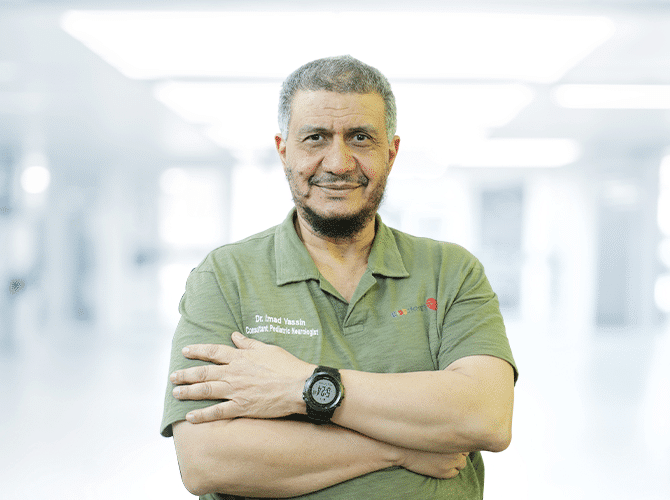Spina Bifida and Tethered Cord
Spina Bifida and Tethered Cord
Steady Support for Spinal Cord Conditions — From Birth Through Growth

At KidsHeart Medical Center, we care for children with conditions that affect how the spinal cord formed — or how it’s functioning over time.
Spina bifida and tethered cord syndrome are spinal defects that can impact walking, bladder control, and neurological development.
Some are diagnosed before birth. Others show symptoms gradually as a child grows.
Our Pediatric Neurology team works closely with pediatric neurosurgeons, urologists, and therapists across Abu Dhabi, Dubai, and Al Ain — offering coordinated, long-term support for your child’s needs.

What Are Spina Bifida and Tethered Cord?
- Spina Bifida is a birth defect where the spinal column doesn’t close completely. Severity can range from minor to significant, depending on nerve involvement.
- Tethered Cord Syndrome occurs when the spinal cord is abnormally attached inside the spinal canal, limiting its movement and stretching nerves.
Both conditions may lead to:
- Leg weakness or foot deformities
- Bladder and bowel control problems
- Abnormal gait or scoliosis
- Sensory loss or back pain
- Coordination or balance issues
Some cases are detected early. Others emerge later, requiring vigilant monitoring.
When Should You Seek Neurological Evaluation?
See a Pediatric Neurologist if your child:
- Was diagnosed prenatally or at birth with spina bifida
- Shows signs of tethered cord (leg weakness, foot asymmetry, bladder issues)
- Has a sacral dimple, tuft of hair, or skin changes over the spine
- Complains of lower back pain or gait abnormalities
- Has scoliosis without a clear cause
- Had prior spinal surgery and needs monitoring
Prompt evaluation can prevent worsening nerve damage — and support better outcomes.
How We Evaluate and Support Spinal Cord Conditions
Here’s how we care for children with these conditions:
- Clinical History and Physical Examination: We review birth findings, development, gait, and bladder/bowel control.
- Neurological Assessment: Focuses on strength, sensation, reflexes, and coordination.
- MRI of the Spine: Confirms diagnosis and assesses the degree of tethering or malformation.
- Urological and Orthopedic Coordination: We involve the right specialties based on symptoms.
- Monitoring and Surgical Planning: For progressive symptoms, we refer to pediatric neurosurgery for potential untethering.
Our care doesn’t stop at diagnosis — we guide each stage, from infancy through adolescence.
Why Families Trust KidsHeart
- Pediatric Neurologists experienced in spinal cord developmental conditions
- Access to advanced spinal imaging and diagnostics
- Seamless coordination with neurosurgery, urology, and orthopedics
- Thoughtful, age-appropriate follow-up as your child grows
- Clinics available in Abu Dhabi, Dubai, and Al Ain
We help families manage the medical journey — and the day-to-day reality — of spinal cord conditions.


Dr. Imad Yassin
Consultant Pediatrician/ Pediatric Neurologist – FRCPCH(UK) | Facharzt, FAMAP, Pediatric Neurology Cert (Austria)
Let’s Help You Plan Ahead.
Whether your child is newly diagnosed or needs ongoing support — we’re ready to guide the next step.
Frequently Asked Questions (FAQs)
Yes. Some forms (like spina bifida occulta) have no symptoms, while others may cause significant issues.
Back pain, leg weakness, bladder issues, or foot changes are common signs.
Not always. We base the decision on symptoms and MRI findings.
Many can — with the right support, therapy, and accommodations.
It can if untreated. That’s why early and ongoing care is essential.

